News
STA, 15 May 2019 - The National Council, the upper chamber of parliament, is spearheading a new attempt to help several thousand people who took out mortgages in Swiss francs and ran into trouble when the Swiss central bank stopped protecting the value of the currency in 2015.
It adopted on Wednesday a bill that would make it obligatory for banks to convert all Swiss franc loans to euro at the exchange rate valid at the time the loan agreement was signed.
The new loan agreement would bear interest applicable to euro loans at the time of the original loan agreement, and borrowers would be entitled to get back any excess payments they have already made.
The bill would apply to all Swiss franc loans made between 28 June 2004 and 31 December 2010, including those that have already been fully paid up.
The legislation, which will now have to be examined by the lower chamber of parliament, is substantively the same as a bill proposed by Franc Association, a group lobbying for Swiss franc borrowers, in December 2017.
That bill automatically expired when the new parliament was inaugurated in 2018, with franc borrowers counting on the new parliament being more susceptible to their proposal and enlisting the National Council to help get the legislation into parliamentary procedure.
The new government indicated in late-2018 it was willing to tackle the issue, with the caveat that it would try to seek a different solution than the one proposed by franc borrowers.
The original bill had been strongly criticised by banks, which want the issue resolved on a case-by-case basis rather than with a sweeping systemic law.
It has also come under fire from the European Central Bank, which expressed serious concerns about its retroactive character and effects on the banking sector.
Slovenian courts have so far delivered mixed verdicts in claims brought by borrowers, substantively revolving around whether consumers had the necessary information about risks when they took out loans.
But the Supreme Court appeared to have set a general course for future lower-court rulings with two verdicts in late-2018 that respectively determined that consumer protection rules at that time were more lax, and that banks had sufficiently explained the risks.
At least one case has already made it to the Constitutional Court, which is yet to deliver its verdict.
STA, 15 May 2019 - The board of directors of the European Investment Bank (EIB) approved a EUR 250 million loan for the construction of a second rail track between rail hub Divača and Koper port on Wednesday, the EIB confirmed for the STA.
This approval is considered a significant step to finalising the financial plan for the project estimated at just under EUR 1.2 billion.
To approve the financing, the EIB insisted on a state guarantee for the loan which will be taken out by 2TDK, a company incorporated with the purpose of building and managing the new track.
Infrastructure Minister Alenka Bratušek has previously said that the state guarantee should not be a problem as a relevant bill is as good as ready. It needs to take effect before the loan contract is signed, expectedly by the end of the year.
She told the press after the EIB approved the loan that such a decision was expected, considering that the European Commission already okayed a loan from the EIB.
2TDK CEO Dušan Zorko, who was also confident that the loan would be approved, said that the EIB recognised the importance of this project for the entire region.
The next step will be to negotiate the contract for the loan, said Zorko. Bratušek added that there was no hurry to sign the contract.
"We were in a hurry with the loan so that we could finalise the financial plan for the project and so as not to endanger the EUR 190 million from the EU," the minister said.
"With the EUR 109 million in grants provided by the European Commission, the project can now start," European Commissioner for Transport Violeta Bulc said in a written statement.
The board of EIB directors was expected to discuss the loan to Slovenia in early April, but postponed the decision due to long debates about Brexit, the EIB said over a month ago.
STA, 15 May 2019 - Trade unions have announced they will fight with all available means what they believe are concealed attempts to change the law on minimum wage on demands from employers, as suggested by statements by government officials and debates held by employer representatives. The Labour Ministry denied that changes were in the works.
Speaking at a press conference in Ljubljana on Wednesday, representatives of the trade union confederations ZSSS and Pergam said that they were ready to push for a referendum on the minimum wage law if it was changed.
Slovenian’s minimum wage is currently €886 a month
ZSSS president Lidija Jerkič said that there was an increasing number of signs lately that employer organisations wanted to prevent the provisions eliminating all bonuses from the minimum wage from entering into force in January 2020, as scheduled.
Jerkič said that this was suggested by the statements by PM Marjan Šarec that an agreement should perhaps be found on minimum wage law changes, as well as by Economy Minister Zdravko Počivalšek about employers warning him about the consequence of the exclusion of all bonuses from the minimum wage.
She also pointed to the recent round table debate of the Chamber of Commerce and Industry discussing the "domino effect of the minimum wage law" and certain statements by representatives of employees.
"If this is intended for testing the will of trade unions, let me reiterate clearly that we will not allow unilateral attempts at changing the legislation," Jerkič said.
If the law gets changed without the consent of trade unions, they will use all available means, including referendum, she said, adding that talks about a postponement of the exclusion of bonuses was out of the question.
Find out the average pay for various jobs in Slovenia here
The minority government's partner in the opposition, the Left, also sided with the trade unions and said it would help collect the needed signatures to have a referendum called.
Luka Mesec, the leader of the Left, said that profits were growing in "leaps and bounds", going from EUR 169 million in 2013 to EUR 4.2 billion last year.
Aljoša Čeč, the secretary general of Pergam, also said that employers were undermining social dialogue by trying to change the minimum wage legislation.
ZSSS vice-president Ladi Rožič said that, given the announcements that the Slovenian economy as a whole made EUR 4.2 million in net profit last year, claiming that the minimum wage would destroy the economic model was "unwise and unproductive".
The Labour, Family, Social Affairs and Equal Opportunities Ministry responded by saying that it detected no anomalies or derogations that would require a change in legislation.
It added that the minimum wage must be high enough to allow a decent living without the aid of social transfers.
All out stories on the minimum wage in Slovenia are here
Bookmark this link and find the headlines faster each morning, or follow us on Facebook
A schedule of all the main events involving Slovenia this week can be found here
Visiting Ljubljana? Check out what's on this week, while all our stories on Slovenia, from newest to oldest, are here
This summary is provided by the STA:
Govt moves to appease doctors
LJUBLJANA - The government reduced the workload on general practitioners in terms of the number of patients they need to take in the wake of mass notices by doctors. The new standard was set at per-head index of 1,895, a figure that shows the workload taking into account the number of patients and their age and which translates into 1,383 patients per GP. The new standard will be phased in gradually and doctors would not be able to turn away existing patients, while new patients will be temporarily assigned to GPs with lowest workload. The new standard meets doctors' demands.
Electoral reform: Parties prefer relative preferential vote
LJUBLJANA - The meeting of parliamentary parties on changes to electoral legislation hosted by President Borut Pahor eliminated the option of introducing an absolute preferential vote, as the parties prefer a relative preferential vote. Legislative changes to that effect will expectedly be ready by July. Over the summer, the Public Administration Ministry is also expected to finalise legislative changes that would redraw the borders of electoral districts. Pahor is hosting a series of meeting to reach a consensus on the reform after the legislation determining the size of electoral districts was declared unconstitutional at the end of 2019.
Coalition agrees on concept for demographic fund
LJUBLJANA - Coalition partners agreed on a concept for the long-planned demographic fund as the finance minister presented them the guidelines under which state-owned companies labelled as portfolio investments, in which the state is not required to preserve a controlling stake, would be included in it. The bill to set up the fund will expectedly be drafted in June or July, and could be passed by the end of the year, said Brane Golubovič, the head of the Marjan Šarec List (LMŠ) deputy group, as he came out of the meeting. The fund is seen as a way of shoring up the public pension system making it more sustainable.
MPs call for repatriation of Slovenians from Venezuela
LJUBLJANA - Members of parliament urged the government to help Venezuelans of Slovenian origin leave the country by immediately starting repatriation procedures as permitted by law. The appeal came at a session of the parliamentary Commission for Slovenians Abroad in the midst of mounting media reports that many of the several hundred Venezuelans of Slovenian origin would like help from Slovenia to escape the hardship.
MPs propose govt draft digital services tax bill by April
LJUBLJANA - The parliamentary Finance and Monetary Policy Committee will propose to the government to draft a bill by next April under which Slovenia would introduce a tax on digital services as of September 2020. At the session requested by the opposition Left, its MP Luka Mesec noted that while the European Commission had prepared the groundwork, there was no consensus among EU member states regarding this tax. The Finance Ministry has no information about the volume of digital services provided in Slovenia by the world's largest digital companies, which means they do not pay value added tax (VAT).
Minister Cerar attends CoE ministerial
HELSINKI, Finland - Foreign Minister Miro Cerar held talks with senior Council of Europe (CoE) officials as he attended a ministerial coinciding with the 70th anniversary of the 47-member organisation. The meeting with CoE Secretary General Thorbjorn Jagland revolved around a recent report on how to strengthen the organisation going forward, which Jagland prepared for the ministerial.
Successors sell former Yugoslav embassy building in Tokyo
LJUBLJANA - A building in Tokyo that used to house the Yugoslav embassy and residence has been sold by the successor states for EUR 15 million. Slovenia will get 14% of the proceeds or EUR 2.1 million, the Foreign Ministry said. The successor states are also in the process of selling the building of the former Yugoslav mission in New York, the former embassy building in Bern and a former consulate in Bonn. The ministry said the division of diplomatic buildings, one of the last remaining assets the successors have to divide, is proceeding very well.
Insurance group Sava more than doubles quarterly net profit
LJUBLJANA - Sava Insurance Group, Slovenia's second largest, posted EUR 10.9 million in net profit in the first quarter of the year, up 136% year on year, as gross premiums written rose by 2.8% to EUR 171.6 million. Core company Sava Re said in a release the profit growth had been driven by "a benign claims development and improved cost efficiency". The group had EUR 1.8 billion in total assets, up 6.3% over the end of 2018.
Maribor hosting conference on circular economy
MARIBOR - Immediate action is needed to save the planet, European Transport Commissioner Violeta Bulc said at the opening of Circular Change, a two-day international conference dedicated circular economy. "We know what needs to be done. Now it's time we do it," she said at the event, which attracted more than 400 participants from 20 countries. While the non-governmental sector and the young became aware of the problem a long time ago, it is now up to Slovenian politics to make a circular economy and sustainable development the basis of its mentality and all of its activity, she said.
Top tourism event kicking off
PODČETRTEK - The annual Slovenia Incoming Workshop, the largest tourism business event in Slovenia, kicked off at the Terme Olimija spa, featuring nearly 160 foreign companies from 37 countries and more than 160 Slovenian companies until Saturday. The majority of foreign companies come from Italy, Germany and France, but there are also several from the US, China and South Korea. The Slovenian Tourism Board expects more than 3,500 meetings to take place.
Pivec meets Macedonian agri minister to discuss coop
SKOPJE, North Macedonia - Agriculture Minister Aleksandra Pivec completed a two-day visit to North Macedonia by attending a honey breakfast hosted by a primary school in Ohrid as part of its project honouring 20 May World Bee Day. On Wednesday, she met Macedonian counterpart Ljupčo Nikolovski to discuss bilateral cooperation, chiefly Slovenia's assistance to North Macedonia in its efforts to join the EU. They also opened a new wine cellar of Slovenian company Puklavec Family Wines.
Number of people in employment continues to rise
LJUBLJANA - The number of people in employment in Slovenia increased in March at both annual and monthly levels to 890,000, up 0.6% over February and 3.1% over March 2018, the Statistics Office said. The number of persons in employment increased in all parts of Slovenia and across all sectors on the monthly level. Compared to March last year, the number of persons in employment dropped in four out of twenty sectors.
Large-scale exhibition of Slovenian art opens in Prague
PRAGUE, Czech Republic - A large-scale exhibition of Slovenian art opened at Prague Castle, featuring 474 works of art, the largest shipment of Slovenian national heritage abroad in the country's history, according to the National Gallery. Impressionism from Dawn till Dusk. Slovenian Art 1870-1930 focuses on impressionists, but also includes works by artists who were connected to the Czech Republic by either studying there, being friends with Czech artists or leaving their work in the country.
Maribor again national football champions
CELJE - Maribor won their 15th national football championship three rounds before the end of the season with a 3:1 win in Celje on Wednesday. The club secured its seventh national championship title in the last nine seasons in the last ten minutes of the match with goals by Jan Mlakar and Dino Hotić. The only Slovenian club to have played in the UEFA Champions League has dominated Slovenian football lately, with Olimpija being the only other title winner in the last nine years.
Roglič loses overall lead of Giro d'Italia
ROME, Italy - After wearing the pink jersey for the first five days of the legendary Giro d'Italia, Slovenian cyclist Primož Roglič (Jumbo-Visma) lost the overall lead to Italian Valerio Conti (UAE Emirates) today. He is now 11th overall, 5:24 behind Conti. Tomorrow, a 180-kilometre, equally hilly stage is on the programme, taking the cyclists from Vasto to l'Aquila.
Slovenia is a small country, with just over two million people and a capital where it can be hard to find something to eat after midnight. But that doesn’t mean it isn’t home to businesses, artists and designers who can enjoy its sleepy charms while still engaging with the wider world. One of these is Olga Košica, a jeweller, artisan and artist who can be found working in the small studio she shares with Martina Obid Mlakar in Ljubljana's Old Town, designing, making and selling her pieces around Europe, in Asia, and elsewhere. Intrigued by her story, I got on my bicycle to learn more about how a small business, drawn from the hands and heart, could do all this. Along with some pictures of Olga’s work, here are some excerpts from our conversation
I started my career almost by chance. I took a short course in college, an introduction to jewellery, and was fascinated. From then on I wanted to learn more. I couldn’t do that in Slovenia, because there weren’t the schools, so I applied to study in London, at the Royal College of Art, and was lucky enough to be accepted, and I did my MA there.

Photo: Olga Košica

Photo: Olga Košica
I already had some basic knowledge, but at RCA they really encouraged me, and saw my potential. They also provided a lot of support, in terms of, say, technicians and equipment. I was there for two years, working every day, but it was wonderful, because there’s everything at your disposal. It’s a great school.
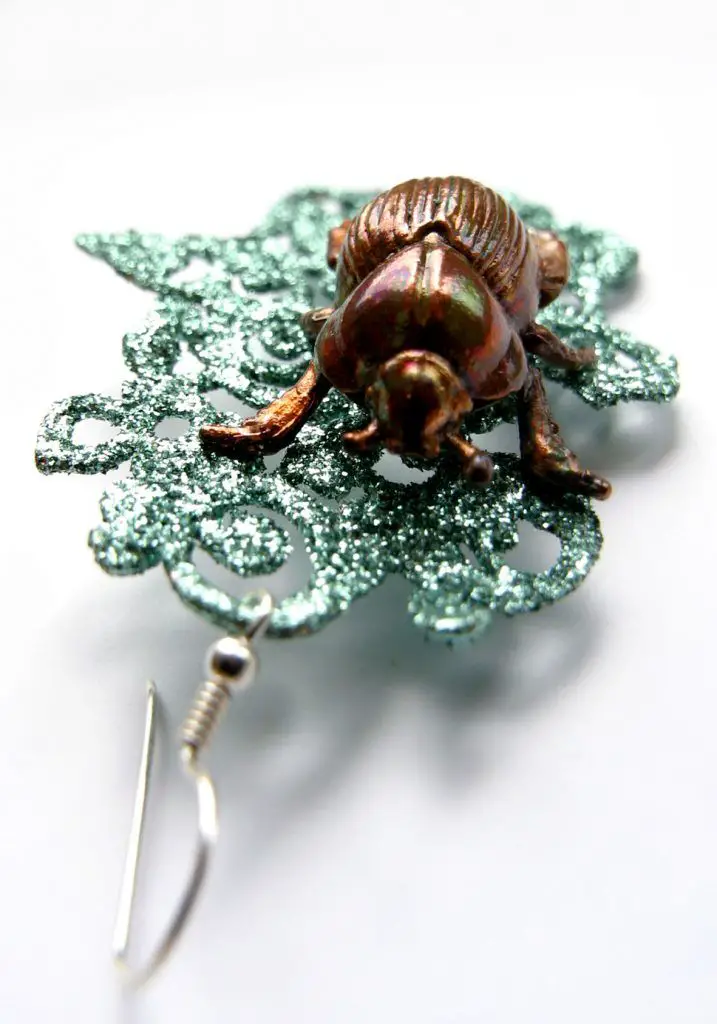
Photo: Mimi Antolović
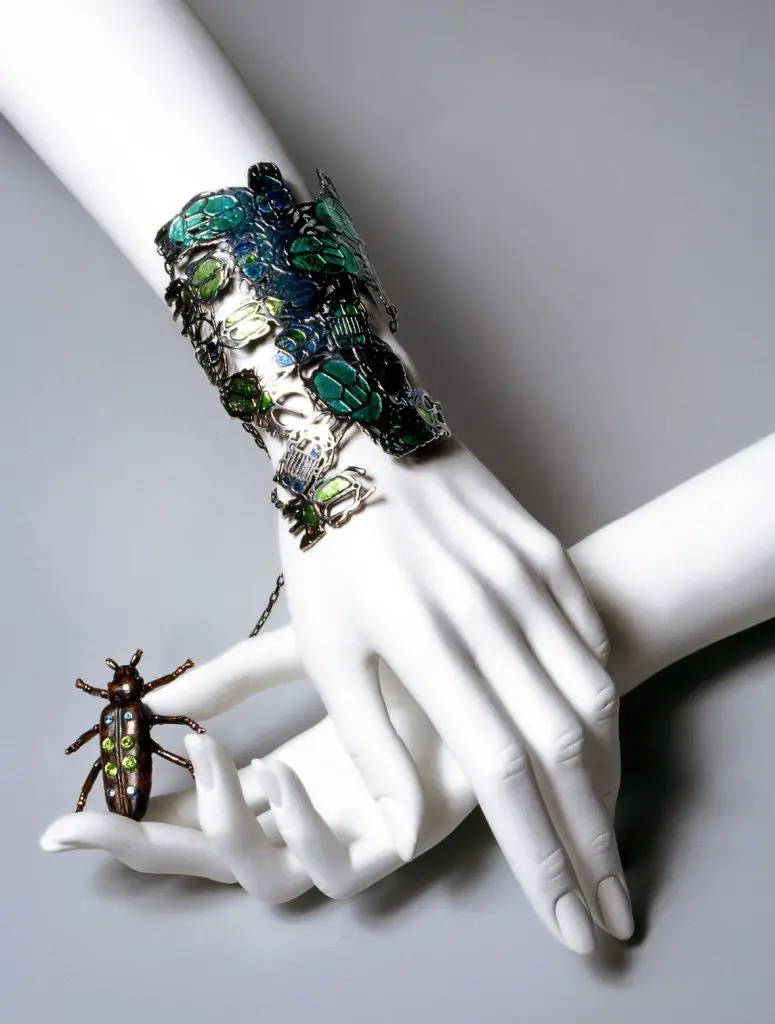
Photo: Mimi Antolović
Back then I was rying many different things, and you can still see some of those pieces here in the store. A lot of them, like this necklace, were electroformed using wax, but – as you can see – this piece is falling apart, because I’ve loaned it out for so many fashion shows, photos shoots, and so on. I did a lot of electroformed pieces in London, which looked like coral, and also beetles, a lot of beetles, because when I start something it’s like a production line.

Photo: Rok Marinšek

Photo: Rok Marinšek
I work freelance. This is my workshop, so here I can handmake certain pieces. But when I work for Zlatarna Celje I just make the designs, not the physical pieces. I've been working with them for 14 years now. I did some gold collections, but mainly I worked on their silver line – LENCIA.
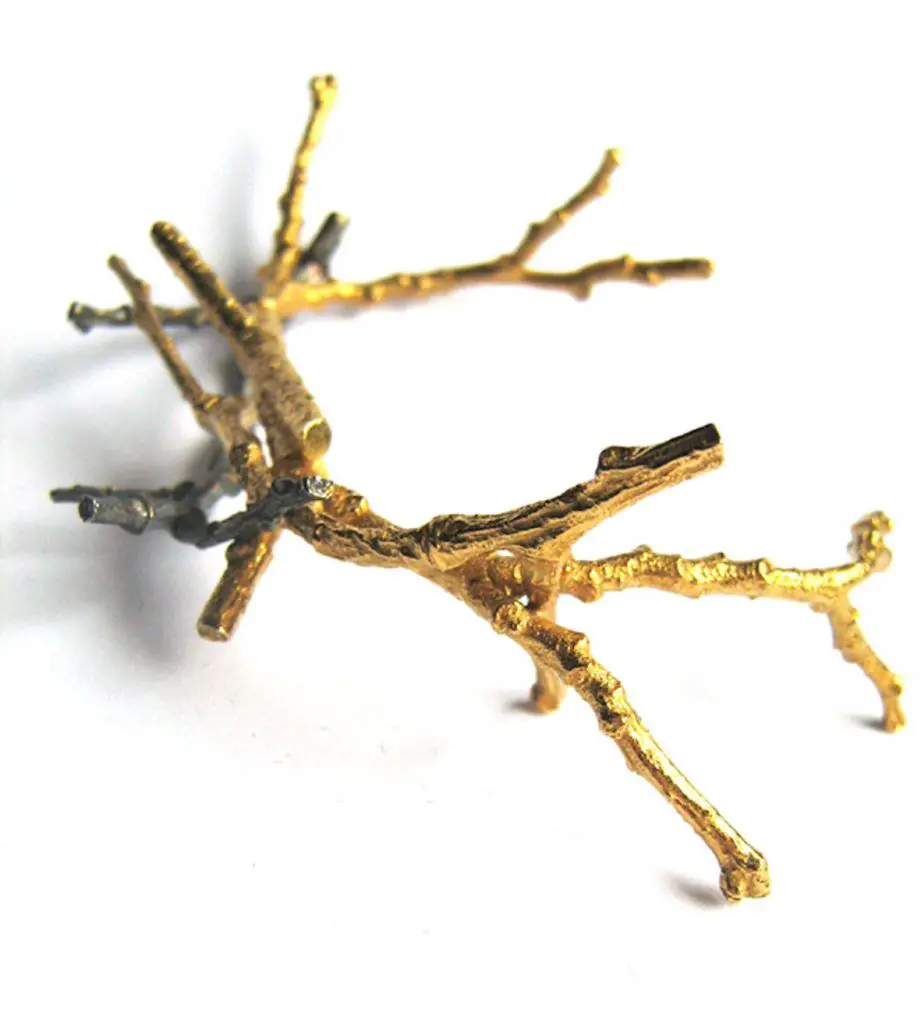
Photo: Olga Košica
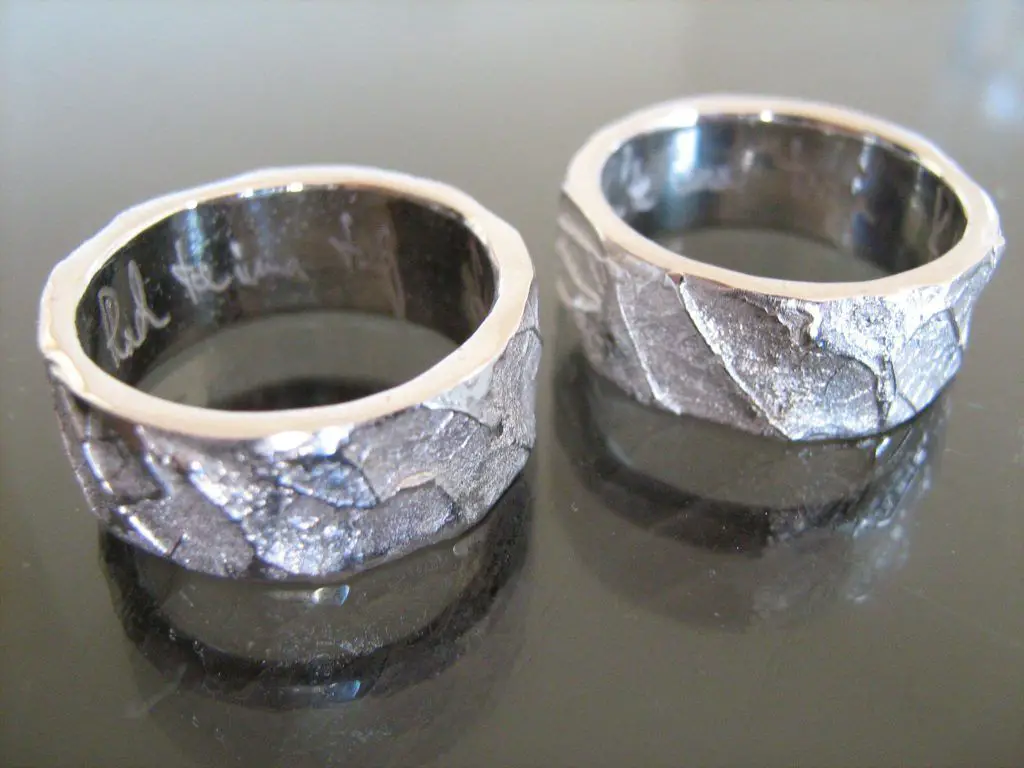
Photo: Olga Košica
Another project I spend a lot of time on is 3-D printing, which I do along with the graphic designer Rok Marinšek for the Chinese designer Masha Ma, to be used as part of fashion show at Paris fashion week.. They’re made of polyamide, and they’re really fun. We started about 6 years ago, when in Maribor they’d just got a huge machine. It was very exact, the best for its time, and they wanted some designers to use it, to see what could be done.

Photo: Rok Marinšek

Photo: Matjaž Banič
We played around with it and produced some really interesting things. Some of those were taken to Paris by Andrej Skok, a Slovenian stylist who works with Masha Ma, and that’s how that collaboration started. We produce some of this here in Slovenia, but for certain pieces we send the files to i.materialise, a Belgian company.

Photo: Rok Marinšek

Photo: Rok Marinšek
I move between different projects and different ways of working. So sometimes I’m working on the computer, producing a file for 3-D printing, and with that you can go into incredible detail that wouldn’t be possible by hand. For example, I made some 3-D printed frozen flowers, and you can see the ice. But these aren’t real frozen flowers that were scanned, they were all designed. And then when you have the data of course you can change the size, stretch it, copy-paste it, move it around. In that way you can get a lot of different pieces out of one design element.
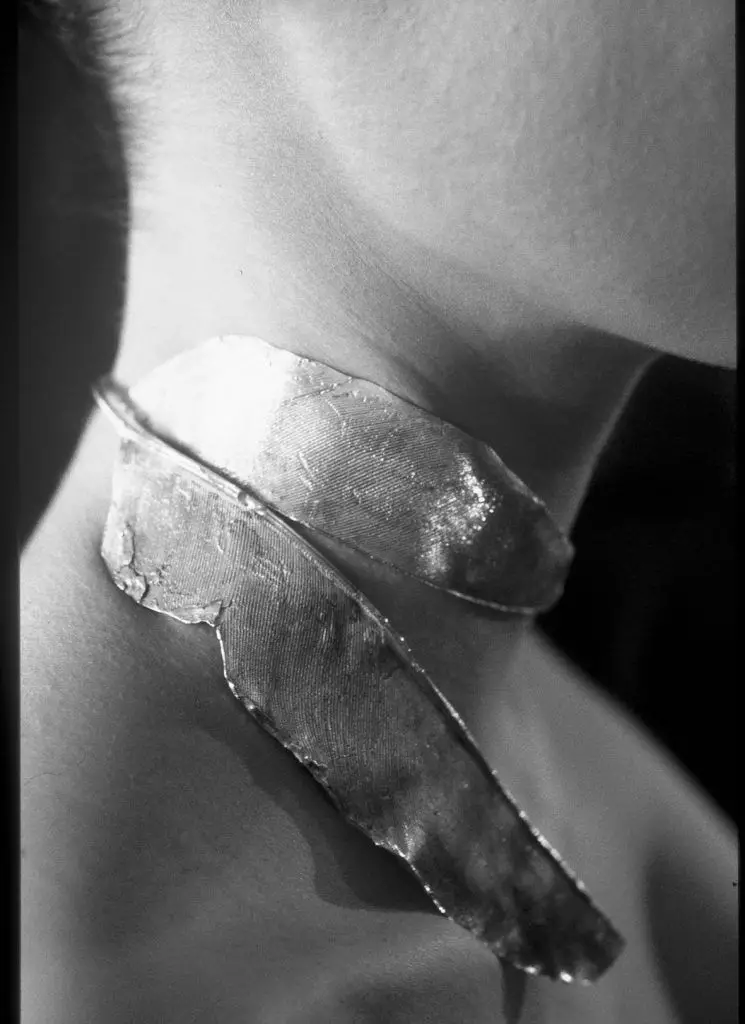
Photo: Mimi Antolović

Photo: Olga Košica
But then I also enjoy making the pieces myself, in the workshop, because that can be more spontaneous. Of course, people are surprised when they come to the workshop and they see the reality. Jewellery is very delicate, but the process of making it can be very brutal, and you need a lot of force to stretch metal, change its shape, or make some wire. Which is why this all used to be seen as men’s work.
You can see more of Olga Košica’s work on her website or, if you happen to be at the far end of Ljubljana’s Old Town, visit her workshop instead at Gornji trg 26.
STA, 16 May 2019 - Maribor have secured their 15th national football championship three rounds before the end of the season with a 3:1 win in Celje on Wednesday.
After blowing the chance of locking up the title last Saturday at home against the rivals Olimpija Ljubljana, Maribor were far more determined last evening in Celje.
The seventh national championship title for the club from Slovenia's second city in the last nine seasons was secured in the last ten minutes with goals by Jan Mlakar and Dino Hotić.
The win was coupled with Olimpija, the defending champions, losing at home to Domžale to fall eleven points behind Maribor three rounds to go.
Olimpija has been the fiercest rival to Maribor this season, but too much turmoil within the club has not allowed the rivalry to be close although Olimpija has maintained its second place in the rankings since the 8th round.
Maribor have meanwhile kept the first place in the standings since the second round, coming out of the gates in the first five matches by scoring as many as 19 goals.
The club has also remained at the top in terms of goals scored, while the defence headlined by goalie Kenan Pirić allowed a season-leading 29 goals so far, six goals fewer than the closest opponent in this department, Mura.
Maribor, the only Slovenian club to have played in the group stage of the UEFA Champions League, have been dominant lately, with Olimpija being the only other title winner in the last nine years, in the 2015/16 and 2017/18 seasons.
Commenting on the feat, Maribor head coach Darko Milanič said the club had been very dominant this season, and praised the players as well as the fans for "their unbelievable support".
"We're working hard, we've deserved the championship, and I'm very proud of the team. I enjoy sitting on this bench, as many good things are happening," he added.
Sport director Zlatko Zahovič is happy that Maribor have managed to defeat the financially stronger Olimpija. "When the opponent functions only with money, it is hard to play against it."
Maribor will have the opportunity to win the double title as they play Olimpija in the national cup final at the end of the month.
STA, 15 May 2019 - The US army has decided to curtail ongoing military activities in Slovenia due to restrictions imposed at the Poček grounds near Postojna, the US Embassy in Ljubljana has said.
"US Forces are awaiting concrete rules and guidelines, to be outlined by the Ministry of Defence in consultation with local municipalities, so that they can forecast, plan, and conduct future training within those rules and guidelines," the embassy told the STA on Wednesday.
The statement comes after TV Slovenija reported Monday that the US military had been considering no longer participating in joint exercises in Slovenia in the current scope because at Poček, night-time activities are limited due to protests by the local community.
Defence Minister Karl Erjavec however said after a meeting with Gautam Rana, the chargé d'affaires at the US Embassy, there was no reason for concern since the planned exercises would be carried out as agreed.
The embassy said today the US forces appreciated the opportunity to train jointly with the Slovenian Armed Forces in an area with well-established range facilities like those in Poček.
"We respect the importance of ongoing discussions with the local community, as the intent of US Forces is always to train with allies like Slovenia in a way that is neither disruptive to the environment, nor the local community."
But executing the training schedule demands "assured, predictable access to the facilities where troops can exercise specific capabilities essential to operational readiness, to include night live-fire."
"New guidelines established by the Ministry of Defence preclude the ability to fully replicate a realistic combat environment for training purposes in Slovenia, meaning US readiness requirements cannot be met."
The embassy also stressed that the bilateral relationship "remains strong, and we enjoy extensive cooperation from the working to most senior levels on a wide variety of issues of mutual interest."
It noted US Army Europe Commander Lieutenant-General Christopher Cavoli visited Slovenia this week for meetings with senior leaders on defence issues, with a large US delegation expected at the Three Seas Initiative Summit in Ljubljana in June.
STA, 15 May 2019 - The 8th Africa Day conference, focussing on the relations between Africa and Europe, and economic and investment opportunities in Africa, started in Ljubljana on Wednesday with calls for creating jobs for the young in Africa.
Although Africa's economy is expanding, the unemployment is high, especially among the young. Most participants in today's panels on economic transformation, inclusion and jobs, and on the role of the European-African partnership therefore called for the creation of jobs that enable decent living, for quality and accessible education and a good health system.
Addressing the opening, Slovenian Foreign Minister Miro Cerar said dialogue and cooperation should increase both between Europe and Africa, and Slovenia and Africa.
Cerar also pointed to today's signing of a memorandum on economic cooperation between Slovenia and Ghana.
The Slovenian Foreign Ministry has also drawn up a five-year plan for cooperation between Slovenia and the Sub-Saharan Africa based on the existing framework, which Slovenia has been actively implementing, he said.
Cape Verde Foreign Minister Luis Filipe Lopes Tavares said Africa was not some distant world for Europe but its neighbouring continent. Sylvie Baipo-Temon, the foreign minister of Central African Republic, said Africa was a continent of the future, and that both Africa and the EU, including Slovenia, should take advantage of that.
Deputy Foreign Minister of Ghana Mohammad Habibu Tijani called for the development of strategic partnership between Africa and Europe, and the enhancing of cooperation between Slovenia and African countries.
Slovenian Education Ministry State Secretary Martina Vuk stressed the importance of education, saying it was the capital of the future. She called for lifelong learning and nurturing of social skills.
Marius Mensah of the Maribor Faculty of Law, who comes from Benin, said solutions needed to be found for the young African labour force.
Madelein Mkunu, the co-founder and president of non-profit forum Leading Women of Africa, said only equal partnership between Europe and Africa could bring stability and prosperity to Africa.
The representative of the European Commission at the conference, Antii Pekka Karhunen, asserted that the Commission wanted to contribute to Africa's development and supported the different forms of equal partnership between the two continents.
He noted that under the EU External Investment Plan, EUR 4.5 billion would be available to Africa and Europe's neighbouring countries until 2020. The EU wants to promote sustainable development in various areas, finance micro, small and medium-sized companies, and invest in education, he said.
Several bilateral meetings were held on the margins of the conference.
Minister Cerar held talks with his Central African Republic counterpart Sylvie Baipo-Temon, in what was the first ministerial visit since the establishment of diplomatic ties in 2017.
The focus was on opportunities for bilateral cooperation, in particular in agriculture, water management, the food industry, pharmaceuticals, telemedicine and IT, the Foreign Ministry said.
Economic cooperation was also in focus of talks between Foreign Ministry State Secretary Dobran Božič and Ghanaian Deputy Foreign Minister Mohammad Habibu Tijani.
The pair pinpointed agriculture, car industry, and food technology as the principal areas of interest, with Tijani also highlighting Ghana's desire to attract investments in industrialisation to generate higher value added.
Božič and Tijani also signed an intergovernmental agreement on economic cooperation on the occasion, the ministry said.
The annual conference is hosted by the Slovenian Foreign Ministry in cooperation with the African programme of the British Chatham House and the European Commission. It is held ahead of 25 May, the anniversary of the establishment of the Organisation of African Unity, which later became the African Union.
May 16, 2019
In a recent survey evaluating the work of each of the 28 European Commissioners, Margrethe Vestager of Denmark ranks highest, while Hungarian Tibor Navrascis the lowest. Slovenian commissioner Violeta Bulc ended near the bottom at 21st place, reports POP TV today.

Source: CBW report
In her five-year mandate the highest ranking European Commissioner for Competition Margrethe Vestager put the pressure on many multinational companies who have until then managed to avoid paying taxes in the EU. As a result, the two tech giants Google and Apple were hit with a combined bill for nearly 20 billion in fines, notes BCW Communications Agency, which carried out the survey.
The most successful move of the European Commissioner for Transportation, Violeta Bulc, is seen in her attempt to raise the tolls paid by drivers of high polluting vehicles, while her greatest failure is identified as her attempt to end the seasonal changing of the clocks in Europe (although this attempt has not yet been defeated, simply not agreed on).
However, Bulc enjoys very high popular support in her home country. According to Mediana polling agency, she’s been placed between 2nd and 4th on a list of Slovenian politicians throughout her term as Commissioner.
Looking through a recent report on immigration and Slovenia, we found an interesting table at the end, created using Eurostat data, showing the number of foreign citizens registered as resident in Slovenia by country of birth. The headline news was that out of total of 2,066,880 people living in Slovenia (as of January 2018), 250,226 were born in another country, with the vast majority (86%) being from other Ex-Yugoslavian nations.
Related: The places where foreigners live in Slovenia and where they come from (July 2016 data)
Since such figures are of obvious interest to our readers, we reproduce them below in two forms. First, place of birth ranked by number of residents, and second (you can jump there here) in alphabetical order. Note that continents and regions are also included in the data, and we know that Africa is not a country.
Place of birth, by number
Slovenia 1,816,654
Bosnia and Herzegovina 107,676
Croatia 44,994
Serbia 25,372
Northern Macedonia 17,128
Kosovo 17,050
Germany 7,255
Italy 4,136
Montenegro 3,344
Russia 3,009
Asia 2,966
Austria 2,641
Ukraine 2,495
Americas 2,358
Bulgaria 1,241
North America 1,140
East Asia 1,123
France 1,119
China including Hong Kong 977
Switzerland 922
South America 832
Africa 822
United States 768
United Kingdom 642
West Asia 554
Slovakia 541
South East Asia 529
South Asia 464
Hungary 429
Argentina 413
Romania 407
Poland 392
Canada 372
Oceania 372
Australia and New Zealand 368
Czech Republic 363
Moldova 361
Australia 342
Netherlands 336
North Africa 333
Sweden 324
Belgium 308
Central Asia 296
Caribbean 288
Thailand 269
West Africa 214
Syria 199
Belarus 192
Kazakhstan 187
Dominican
Republic of 185
Turkey 184
India 181
Spain 179
Brazil 165
East Africa 164
Philippines 150
Iran 143
Egypt 127
Albania 126
Greece 119
Central America 98
Iraq 93
Japan 87
Cuba 85
Mexico 78
Tunisia 78
Venezuela 75
Uzbekistan 70
Denmark 68
Nigeria 64
South Africa 62
Jordan 60
Portugal 59
Ireland 58
South Africa (Rep.) 58
Ghana 56
Indonesia 56
Peru 56
Central Africa 49
Colombia 49
Libya 47
Pakistan 46
Lithuania 46
Israel 42
Luxembourg 41
Afghanistan 38
Finland 37
Algeria 37
Chile 36
South Korea 35
Kenya 33
Morocco 31
Guinea-Bissau 31
Lebanon 30
Nepal 28
New Zealand 27
Eritrea 26
Somalia 25
Azerbaijan 25
Georgia 24
Norway 23
Cameroon 23
Estonia 22
Vietnam 22
Taiwan 22
Saudi Arabia 21
Gambia 20
Kyrgyzstan 13
Madagascar 18
Armenia 18
Sri Lanka 17
United Arab Emirates 17
Ethiopia 16
Zimbabwe 15
Yemen 15
Uruguay 14
Bangladesh 13
Kuwait 12
Sudan 12
Turkmenistan 12
Bolivia 12
Democratic Republic of Congo 11
Malaysia 11
Ecuador 11
Liberia 10
Liechtenstein 10
Singapore 9
Tajikistan 9
Congo 9
Cambodia 8
Cyprus 7
Guinea 7
Jamaica 7
Malta 7
Mauritius 7
Zambia 7
Burkina Faso 7
Iceland 6
Costa Rica 6
Sierra Leone 5
Uganda 5
Belize 5
Burundi 4
Cape Verde 4
Mali 4
Mongolia 4
Mozambique 4
Nicaragua 4
Palestine 4
Senegal 4
Trinidad and Tobago 4
Angola 4
Ivory Coast 3
Honduras 3
Laos 3
Malawi 3
Melanesia 3
Namibia 3
Paraguay 3
Tanzania 3
Barbados 3
Central African Republic 2
Guyana 2
Haiti 2
Myanmar / Burma 2
Panama 2
Papua New Guinea 2
Qatar 2
Rwanda 2
Western Sahara 2
Aruba (NL) 2
Benin 1
Botswana 1
Chad 1
Dominica 1
Salvador 1
Fiji 1
Former Netherlands Antilles 1
Gabon 1
Guatemala 1
Maldives 1
North Korea 1
Oman 1
Polynesia 1
San Marino 1
St. Thomas and Prince 1
Togo 1
Wallis and Futuna 1
Andorra 1
In alphabetical order
Afghanistan 38
Africa 822
Albania 126
Algeria 37
Americas 2,358
Andorra 1
Angola 4
Argentina 413
Armenia 18
Aruba (NL) 2
Asia 2,966
Australia 342
Australia and New Zealand 368
Austria 2,641
Azerbaijan 25
Bangladesh 13
Barbados 3
Belarus 192
Belgium 308
Belize 5
Benin 1
Bolivia 12
Bosnia and Herzegovina 107,676
Botswana 1
Brazil 165
Bulgaria 1,241
Burkina Faso 7
Burundi 4
Cambodia 8
Cameroon 23
Canada 372
Cape Verde 4
Caribbean 288
Central Africa 49
Central African Republic 2
Central America 98
Central Asia 296
Chad 1
Chile 36
China including Hong Kong 977
Colombia 49
Congo 9
Costa Rica 6
Croatia 44,994
Cuba 85
Cyprus 7
Czech Republic 363
Democratic Republic of Congo 11
Denmark 68
Dominica 1
Dominican
East Africa 164
East Asia 1,123
Ecuador 11
Egypt 127
Eritrea 26
Estonia 22
Ethiopia 16
Fiji 1
Finland 37
Former Netherlands Antilles 1
France 1,119
Gabon 1
Gambia 20
Georgia 24
Germany 7,255
Ghana 56
Greece 119
Guatemala 1
Guinea 7
Guinea-Bissau 31
Guyana 2
Haiti 2
Honduras 3
Hungary 429
Iceland 6
India 181
Indonesia 56
Iran 143
Iraq 93
Ireland 58
Israel 42
Italy 4,136
Ivory Coast 3
Jamaica 7
Japan 87
Jordan 60
Kazakhstan 187
Kenya 33
Kosovo 17,050
Kuwait 12
Kyrgyzstan 13
Laos 3
Lebanon 30
Liberia 10
Libya 47
Liechtenstein 10
Lithuania 46
Luxembourg 41
Madagascar 18
Malawi 3
Malaysia 11
Maldives 1
Mali 4
Malta 7
Mauritius 7
Melanesia 3
Mexico 78
Moldova 361
Mongolia 4
Montenegro 3,344
Morocco 31
Mozambique 4
Myanmar / Burma 2
Namibia 3
Nepal 28
Netherlands 336
New Zealand 27
Nicaragua 4
Nigeria 64
North Africa 333
North America 1,140
North Korea 1
Northern Macedonia 17,128
Norway 23
Oceania 372
Oman 1
Pakistan 46
Palestine 4
Panama 2
Papua New Guinea 2
Paraguay 3
Peru 56
Philippines 150
Poland 392
Polynesia 1
Portugal 59
Qatar 2
Republic of 185
Romania 407
Russia 3,009
Rwanda 2
Salvador 1
San Marino 1
Saudi Arabia 21
Senegal 4
Serbia 25,372
Sierra Leone 5
Singapore 9
Slovakia 541
Slovenia 1,816,654
Somalia 25
South Africa (Rep.) 58
South Africa 62
South America 832
South Asia 464
South East Asia 529
South Korea 35
Spain 179
Sri Lanka 17
St. Thomas and Prince 1
Sudan 12
Sweden 324
Switzerland 922
Syria 199
Taiwan 22
Tajikistan 9
Tanzania 3
Thailand 269
Togo 1
Trinidad and Tobago 4
Tunisia 78
Turkey 184
Turkmenistan 12
Uganda 5
Ukraine 2,495
United Arab Emirates 17
United Kingdom 642
United States 768
Uruguay 14
Uzbekistan 70
Venezuela 75
Vietnam 22
Wallis and Futuna 1
West Africa 214
West Asia 554
Western Sahara 2
Yemen 15
Zambia 7
Zimbabwe 15
STA, 16 May 2019 - Most parties and lists running in the European Parliament election except for the more radical players do not see Brexit as a positive development. They however point to different reasons for the British leaving the EU.
The coalition Modern Centre Party (SMC) told the STA Brexit was a negative decision for all and that the EU and UK would continue to cooperate closely in the medium run, at least in the most important fields of common interest.
The Social Democrats (SD) said that there was still a possibility that there will be no Brexit, and that if it happened, it was in everybody's interest that the procedure be carried out responsibly.
It added that exits from the EU and extremes could not be predicted, while being an obvious consequence of irresponsibility of populists and the danger they pose to Europe.
While no one knows what will happen with the UK, the EU needs to strengthen ties between the countries which are aware of the benefits of membership, while at the same time effectively responding to pressing issues, said the Pensioners' Party (DeSUS).
The coalition Alenka Bratušek Party (SAB) believes that Brexit is a warning for everybody that elections are important. Many people in the UK, especially the young, would like to go back in time and cast their votes in the Brexit referendum.
The ruling Marjan Šarec List (LMŠ) warned that the consequences of Brexit on the flow of goods, services, capital and workforce will be felt both by citizens and companies.
The prime minister's party is convinced that Brexit will be a lesson for the entire EU and that no other member state will decide to leave the bloc.
The minority coalition's partner in the opposition, the Left, argues that the UK has been taken away from the EU by right-wing populism. This is a signal for EU citizens that they are not able to decide on the fate of their own countries.
According to the party, this blow to democracy has triggered a wave of Euroscepticism which will not subside until the EU becomes democratic.
The opposition Democrats (SDS) and non-parliamentary People's Party (SLS), which are fielding a joint list, believe that the consequences of Brexit will depend on its final form and the duration of the transitional period.
The parties think that no other EU member state would decide to exit the bloc at the moment, as trust in the EU is at the highest level since 1983.
The opposition New Slovenia (NSi) said that the British have "jumped into an empty swimming pool" and that it did not believe a full Brexit will take place.
If the political elite is not able to decide, they should let the people decide one more time, as they are now acquainted with the consequences, the party added.
The far-right National Party (SNS) believes that Brexit has failed to strengthen the unity of the EU, but has shown that the EU does not know what it wants and that it is not able to solve this issue.
"Brussels is buying time and making London make decisions, while London is waiting for the EU to make a move," said the SNS, which sees some other member state leaving as a possibility and suggests Slovenia should think about this option.
Slovenia leaving the EU is also being proposed by the non-parliamentary United Slovenia (ZSi), which argues that Brexit is a nice example of how interests of corporations outweigh referendum decisions of the people.
Brexit has been blocked so that the will expressed by the British does not become an example for other countries, the party said, calling for "Sloexit" due to violations of fundamental human rights in the EU.
The Homeland League (DOM) believes that Brexit is a "symptom of the EU's illness". Leaving the EU is the country representing 20% of GDP of the EU, the strongest member military-wise and the oldest democracy, the party noted.
Good State (DD) argues that Europeans have obviously forgotten that the EU is a guarantor of political stability.
The Let's Connect list believes that Brexit is a "national and European disaster and a consequence of the decades of demagoguery of the British governments, which have blamed Brussels for their own incompetence".
The Greens think that Brexit will have a negative impact both on the EU and the UK and hope for a second referendum, which would save the younger generation in the UK which strongly opposes Brexit.




